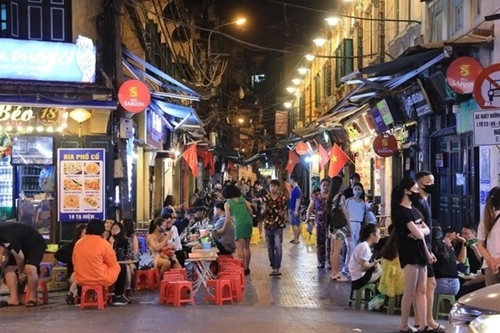The conclusion underlines the need to develop typical night-time economic models of each area in the city, building the capital city’s night-time trademark, and affirming Hanoi’s competitiveness compared to other regional and international destinations.
    |
 |
|
Ta Hien street, one of the night-time hubs for tourists in Hanoi |
It points to the need to make full use of Hanoi’s advantages in lakes and rivers, especially the West Lake, Red River, Duong River, and To Lich River, while defining the development reserve areas for future generations.
The Politburo asked the city to arrange and allocate suitable spaces for the development of cultural industries and entertainment industries, turning tourism into a spearhead economic sector, with priority given to preserving, exploiting and promoting major cultural spaces such as Thang Long Imperial Citadel connecting with Ba Dinh district, the Old Quarter linked with Long Bien district, Co Loa relic complex, Duong Lam ancient village, and a number of traditional craft villages. At the same time, it is also necessary to construct new, modern, unique, and typical cultural works symbolizing the city in the new era.
In the conclusion, the Politburo highlighted the need for Hanoi to build a plan to develop the areas along the Red River banks, thus making the river the development hub of the city with the harmonious distribution of ecological spaces, cultural spaces, historical spaces, green spaces, and modern urban spaces on both sides of the river, contributing to creating a new look of the time-honored, civilized and modern capital. The Red River development space is expected to become a "new development symbol" of the city, it said.
Alongside, the Politburo also asked the city to research and supplement its planning and orienting planning decisions, thereby effectively using the land fund along the banks of Red and Duong Rivers to serve the socio-economic development of the city, especially the tourism and service sector.
Source: VNA